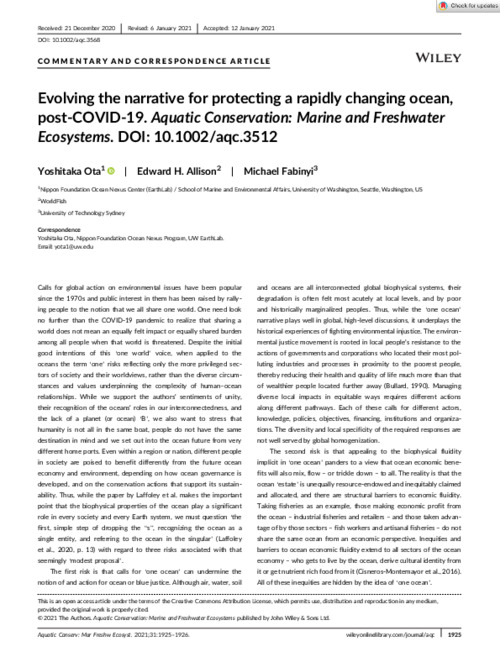Evolving the narrative for protecting a rapidly changing ocean, post-COVID-19. Aquatic Conservation: Marine and Freshwater Ecosystems.

Calls for global action on environmental issues have been popular since the 1970s and public interest in them has been raised by rallying people to the notion that we all share one world. One need look no further than the COVID-19 pandemic to realize that sharing a world does not mean an equally felt impact or equally shared burden among all people when that world is threatened. Despite the initial good intentions of this ‘one world’ voice, when applied to the oceans the term ‘one’ risks reflecting only the more privileged sectors of society and their worldviews, rather than the diverse circumstances and values underpinning the complexity of human–ocean relationships. While we support the authors' sentiments of unity, their recognition of the oceans' roles in our interconnectedness, and the lack of a planet (or ocean) ‘B’, we also want to stress that humanity is not all in the same boat, people do not have the same destination in mind and we set out into the ocean future from very different home ports. Even within a region or nation, different people in society are poised to benefit differently from the future ocean economy and environment, depending on how ocean governance is developed, and on the conservation actions that support its sustainability. Thus, while the paper by Laffoley et al. makes the important point that the biophysical properties of the ocean play a significant role in every society and every Earth system, we must question ‘the first, simple step of dropping the “s”, recognizing the ocean as a single entity, and referring to the ocean in the singular’ (Laffoley et al., 2020, p. 13) with regard to three risks associated with that seemingly ‘modest proposal’.
Permalink
Date Available
Type
Publisher
ISSN
1052-7613,1099-0755
Copyright
CC-BY-NC-4.0
Research Themes
Topics
Language